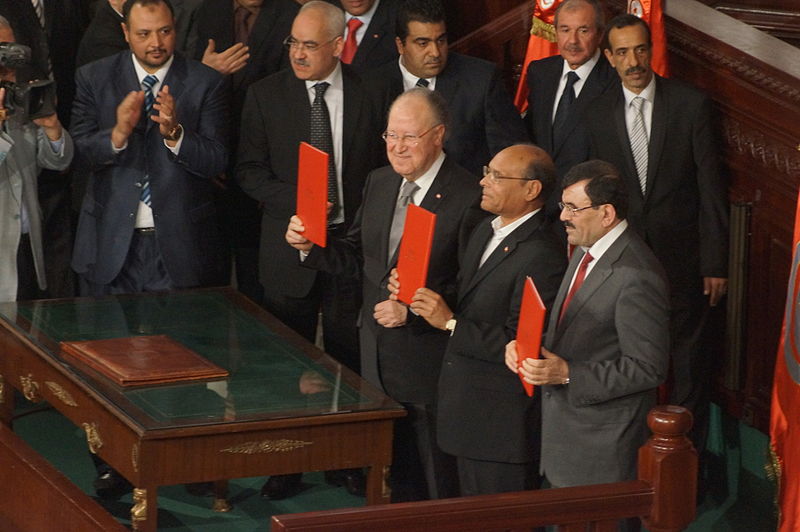Tunisia, the country that sparked the so-called “Arab Spring” and that now represents the greatest hope for democratic transition in the Arab world, celebrates 160 years of constitutionalism this year. What are the roots of constitutionalism in Tunisia, and how can this history help us understand the country’s current political situation?
A long history of constitutionalism
The Fundamental Pact, (ʿahd al-aman in Arabic) was issued in Tunis in 1857. It was legally adopted as the country’s constitution in 1861, at which point it became the first written constitution in the Arab World. Law professor Ebrahim Afsah argues that constitutional struggles in the Arab world are often explained by a lack of institutional tradition. Therefore, the long history of constitutionalism in Tunisia could help explain the relative success of the country’s democratic transition, as compared with other Middle Eastern and North African countries.
Pride in Tunisia’s constitutional heritage is evident in the many political parties that use destour (Arabic for constitution), in their names. Some examples include the Destourian Movement, the New Destour Party, the defunct Destour, Neo Destour, Socialist Destourian parties, and Tajammu‘ Destouri Dimuqrati, the party of former dictator Zine El Abidine Ben Ali. The desire of political groups to root their agendas in constitutional provisions attests to the respect they have for the constitution and for state institutions.
Tunisia’s two pre-revolutionary presidents, Habib Bourguiba and Ben Ali, also tried to use the country’s history of constitutionalism to legitimize their power. Before Tunisia achieved its independence from France, Bourguiba was the leader of the Neo Destour, or New Constitutional Liberal Party (the most prominent political party of the independence period, and the leaders of the separatist movement). After independence, Bourguiba and his party crafted the constitution of 1959 to help reinforce his power. When Ben Ali took over from Bourguiba in a bloodless coup in 1987, he too tried to justify his ascent to power using the 1959 constitution.
In 2011, a popular revolution forced Ben Ali to relinquish his power and flee Tunisia, beginning a new era of democratic leadership. So far, Tunisia has been the only Middle Eastern country to undergo a successful democratic transition following a popular revolution in 2011. Many of Tunisia’s neighbors in the region have struggled to establish stable democratic governments in the years since the Arab Spring.
In the first free elections in Tunisia in 2011, Ennahda was victorious. Importantly, it became the first Islamist party to be democratically elected in the post-Arab Spring period. The party had been banned entirely under Ben Ali.
The newly elected government was tasked with drafting Tunisia’s new constitution, a process which took three years. During that period, the secularist camp and the Islamist camp publicly debated what values would be enshrined in the new constitution. The major disagreements between the two sides centered on what the place of Islam would be in the constitution, and how the document would ensure respect for civil rights and civil liberties.
Remarkably, the Islamists and the secularists were able to reach a compromise, but their intense disagreements translated into contradictions at several points in the new consitution.
A call for dignity
The Tunisian Revolution was characterized by the word karama, which means dignity in Arabic. The desire for dignity was a huge motivating factor for the disenfranchised groups that chose to revolt against dictatorial rule in 2010 and 2011. The concept of dignity now appears explicitly in the preamble and in four different articles of the new constitution. Law professor Aharon Barak suggests that references to dignity in the constitution could be seen as a step towards moving dignity away from being a value, and towards becoming a constitutional right. If Tunisia guarantees dignity as a constitutional right, it could go a long ways towards buttressing human rights. Still, the explicit inscription of dignity into the constitution presents a challenge because of the nebulous nature of the word, and how it can be interpreted differently by different groups.
A new constitution for a new age
Tunisia’s new constitution was adopted on January 26, 2014, and is the hallmark of the country’s successful democratic transition. The document reflects the struggle and the contradictions of post-revolutionary Tunisian society, and is, at the same time, an inspiring model for neighboring countries.
In the assembly elections of 2014, following the adoption of the new constitution, Ennahda accepted defeat. The new government was led by a neo-neo-Destourian party, Nida’ Tounes, or Call of Tunisia, led by the current Tunisian President Beji Caid Essebsi. Nida’ Tounes is a recycling of the deposed dictator’s political party, the Democratic Constitutional Rally, also former Neo-Destour and then Socialist Destourian Party. The return of the Destourians to power has demonstrated that despite being associated with authoritarian rule, their commitment to Tunisia’s constitution and national institutions has made them palatable to some segments of the Tunisian electorate again.
Three years after adopting a new constitution, and 160 years after adopting the first written constitution in the Middle East, Tunisia is still struggling to establish a sustainable, fair and functioning democracy. The Tunisian case has demonstrated that institutions and reconciliatory practices are important for facilitatating democratic transitions. The debate over constitutionalizing the concept of dignity adds to the controversy over the role of Islam in the constitution.
